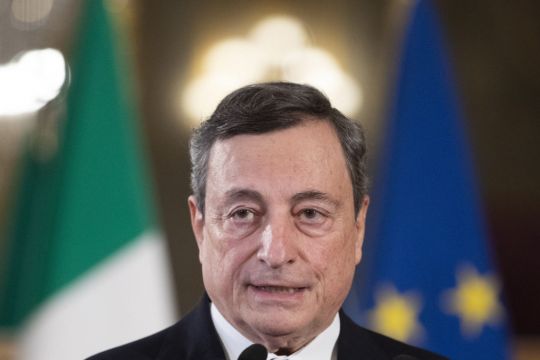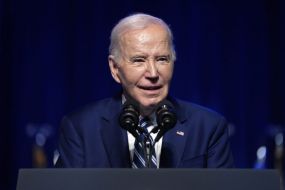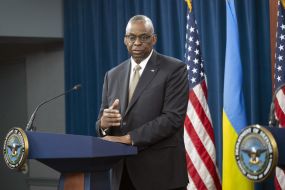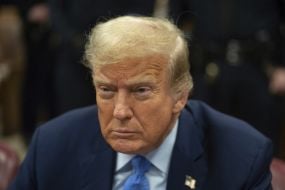Former European bank chief Mario Draghi has agreed to try to form a non-political government to steer Italy through the coronavirus pandemic after last-ditch negotiations among political parties failed to produce a viable governing coalition.
Italian president Sergio Mattarella met with Mr Draghi, who is credited with having saved the euro during Europe’s debt crisis, and gave him a mandate to try to form a new government to replace caretaker premier Giuseppe Conte’s coalition of the 5-Star Movement and Democratic Party.
Mr Draghi told reporters he accepted the mandate knowing that Italy faces the multiple challenges of a health care crisis, a national vaccination campaign and an economic recession and at the same time will have “extraordinary” resources from the European Union to try to help the economy relaunch.

“It’s a difficult moment,” Mr Draghi, 73, said.
Appealing for unity from Italy’s squabbling political forces, he added: “We have the chance to do a lot for our country.”
Mr Conte was forced to resign last month after ex-premier Matteo Renzi pulled ministers of his small, centrist Italy Alive party from Mr Conte’s government.
Mr Renzi, whose nickname is “il rottamatore”, or “the demolisher”, complained among other things about Mr Conte’s plan to spend more than 200 billion euro (£1.8 billion) in EU funds and loans to help the economy recover from the pandemic.
During his tenure at the European Central Bank (ECB), Mr Draghi became known as Super Mario.

He had been rumoured as a possible choice to lead a non-political government if Mr Conte was unable to find enough parliamentary support to continue leading Italy.
Negotiations among political parties failed on Tuesday.
“Draghi to the rescue,” Christopher Dembik, senior European economist at Germany’s Berenberg bank, said, predicting that Mr Draghi would eventually succeed in forming a broad-based government.
But his greatest hurdle will be securing support from the 5-Star Movement, the biggest political block in the Italian parliament and the senior partner in Mr Conte’s government.
The block had insisted on Mr Conte remaining premier and bitterly resented Mr Renzi’s power play that brought him down.

Five-star leader Vito Crimi said the movement would only support a political government.
“As such, it will not vote in favour of a technical government headed by Mario Draghi,” Mr Crimi said in a statement.
For the 5-Stars, a Draghi government imposed by Mr Mattarella poses an almost existential dilemma. The anti-establishment, populist movement emerged as a potent political force in part as a response to Italy’s last technocratic government led by Mario Monti, between 2011 and 2013.
Under Mr Conte, the 5-Stars had led two successive governments starting in 2018, allying first with the right-wing League and then the centre-left Democrats.
Markets and analysts reacted positively to a possible Draghi mandate, with borrowing costs sinking and the Milan Stock Exchanges benchmark FTSE MIB index rallying 2.7% in early trading.
A government headed by a high-profile and respected figure like Mr Draghi was “likely to be seen, especially by market investors, as a very good solution in the short-term”, UniCredit analysts said in a note.
A sombre Mr Mattarella told the nation on Tuesday that he essentially had no choice: While an early parliamentary election was a necessary “exercise in democracy”, calling one would be ill-advised at this crucial time in Italy’s history, the president said.
With over 89,000 confirmed virus deaths, Italy has the second-highest Covid-19 death toll in Europe after Britain. It is trying to ramp up its vaccination campaign and must report back to the EU how it plans to spend the recovery funds.

“It is therefore my duty to make an appeal to all the forces in the parliament so that they grant the confidence to a high-profile government not linked to any political force,” Mr Mattarella said.
Mr Renzi, who was premier from 2014 to 2016, blamed Mr Conte’s forces for the failed negotiations to find a new coalition and governing programme, saying they had rejected his proposals. He made clear he was pleased with the outcome, praising Mr Mattarella’s “wise” decision.
“Now everyone of good will must welcome President Mattarella’s appeal to support the government of Mario Draghi,” he said on Wednesday. “Viva Italia.”
Mr Draghi, a Massachusetts Institute of Technology-trained economist, had led the Italian central bank from 2005 to 2011 when he was tapped to lead the ECB, a job he held until 2019.
Prior to that, he had been a vice chairman and managing director at Goldman Sachs International in London and an executive director at the World Bank.
He is perhaps best known for his intervention as ECB chief during the peak of Europe’s debt crisis in 2012.
As Italy was facing unsustainably high borrowing costs that threatened its financial stability, Mr Draghi said in July 2012 that the central bank was ready to do “whatever it takes” within its mandate to preserve the euro. It proved to be a turning point for Europe.
Italy, the third-largest economy in the European Union, had been heading into a recession even before it became the first country in the West to be hit hard by Covid-19 last February.
The ensuing economic devastation has only made matters worse, with gross domestic product falling 8.8% last year and nearly 450,000 jobs lost, national statistics agency ISTAT reported this week.







